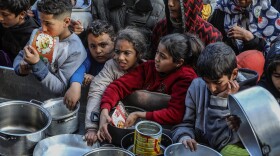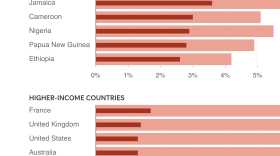
Nurith Aizenman
[Copyright 2024 NPR]
Person Page
-
Famine declarations are relatively rare. But the leading international authority on hunger crises this week declared that regions of war-torn Sudan face catastrophic shortages of food.
-
An announcement of famine — as has now happened regarding Gaza — is a complicated decision. Here's what must be considered before such a declaration is made.
-
Reports of starvation in Gaza raise the questions: Why the hesitation in labeling it a famine? And who are the authorities with the power to make that call?
-
Frustrated when Brazil could not get COVID vaccines, two Brazilian doctors (who have been best friends since college) decided to invent their own version and offer up the patent essentially for free.
-
After initiation rites – including circumcision – the boys leave their families to take charge of the herds, driving them high into the mountains. It's a way of life that climate change is testing.
-
The modern study of starvation was sparked by the liberation of concentration camp survivors. U.S. and British soldiers rushed to feed them — and yet they sometimes perished.
-
A report out this week says hunger, malnutrition and even starvation are widespread in Gaza, but stopped short of declaring it a 'famine.' Here's a primer on what that means, and who gets to decide.
-
The World Health Organization has just released the latest worldwide statistics of the global burden of cancer. Here are five takeaways from WHO's top expert on cancer.
-
Cameroon has officially rolled out the first malaria vaccine approved for routine vaccination, targeting children 6 months and older. It reduces severe disease by 30% among young kids.
-
That's how a prominent medical ethicist describes a researcher's innovative plan to share study results with participants in Kenya.
-
In 2023, six nations were able to eliminate virtually all cases of at least one of the illnesses on the World Health Organization's priority list of "neglected tropical diseases."
-
This year, six countries have managed to eliminate the threat of at least one of the diseases on the WHO's list of "neglected tropical diseases."










